The incredible untold story of Wales’ first all girl group The Fabs
David Owens
It’s more than 50 years ago, but the words of The Who’s Roger Daltrey are still as crystal clear to Sarah Wrigley as they were when they were first spoken.
Then as guitarist and singer with The Fabs, the Welsh band described as ‘Britain’s first all girl beat group’, Sarah and her bandmates were supporting the then emerging rock stars at a gig in south Wales in 1964.
A chance conversation with The Who’s frontman would stay ringing in the Cardiff-born musician’s ears, providing fuel to fire up the group and instill them with a steely determination that would see them through the coming years.
“At the time they weren’t the international supergroup they would become, however they already had a massive following,” she recalls.
“We finished our set and as we were leaving the stage Roger Daltrey spoke to me. He said: ‘You’re not bad love, but you’ll never get anywhere.’
“I took umbrage at this and asked him ‘why not?’
He explained: “Girls love to come and watch the boys playing, and the boys come because of the girls. Also the boys like to imagine themselves on stage with the girls screaming for them. It doesn’t work the same for you.”
Dismissing his comments Sarah and her bandmates felt they could definitely find a place in the music business – and were determined to do so, whatever it took and wherever it took them.

The Cardiff-based musician, now aged 77, has put all her memories and her extensive collection of cuttings and photos into a newly published book – the brilliantly titled ‘Twenty Pairs of Pants and a Passport’.
Thankfully this is not just a chronological yomp through the band’s back pages – fun as that would be – it is much more than that. It’s a rites of passage story of four young girls growing up on stage in a period when liberation and freedom was in the air as the swinging sixties reached its epoch.
It documents a whirlwind eight years of Sarah’s life when she and her best friends experienced something those back home could only dream of.
Theirs is a story unlike any others – a rich tale of unexpected opportunities, fun times in faraway places, a band of sisters determined to eek every last drop out of the manifold opportunities that had been afforded them.
The Fabs’ unorthodox story would take them from Wales to the wider world, to US army bases, ski resorts and Mexican residences, from the Olympics and encounters with Hollywood stars to opportunity knocking in the UK.
It’s also the compelling tale of author Sarah’s own coming of age tale with all the confusion, uncertainty, self-discovery and secrets that brings.
It’s a culmination of the musician being told many times over the years that she should write a book about her adventures with the pioneering Welsh beat group.
“Over the years I’d casually say something in conversation, like ‘I was at the Olympics Games in 1968’ and people would be surprised. So you’d say ‘yeah, I was in a band called The Fabs and we travelled here and we did that’. The reaction is always ‘wow you should write a book’, there can’t be another band that has done anything like that.
“Yes, a lot of bands did those tours in Europe, but they weren’t an all girl group like us. So, over the years we felt that perhaps we did have a story that would be different to everyone else.
“Then when we went into lockdown, I thought if I don’t do it now I never will.”
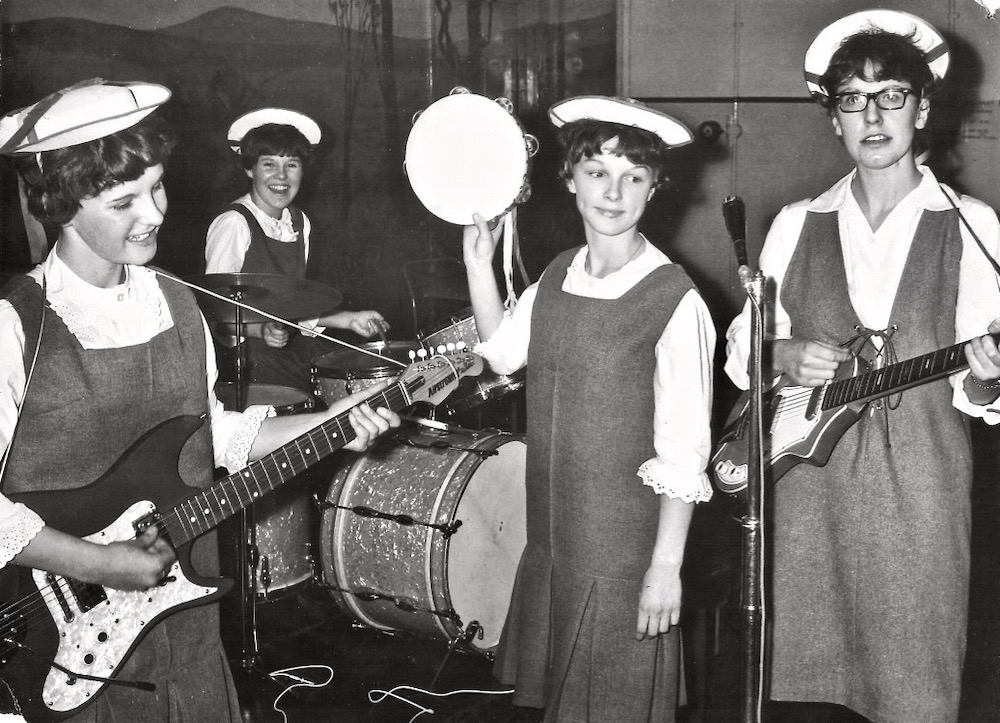
Formed in 1963, when local entertainment impresario Wally Waldini, who had built a reputation for staging summer shows in resorts such as Llandudno and Ilfracombe, had the ingenious idea of putting together an all-girl version of The Beatles.
Sarah – whose dad was a semi-professional musician – put her forward for the group.
“I had just turned 19,” she recalls. “My father had taught me the guitar and I’d played for a few years, however I had no real professional experience. I had played and sung at family gatherings but that was about it.
“Dad knew Wally and when he told me about the girl band I was intrigued to see what it was all about.
“There were hundreds of boy bands springing up, but girls were mainly solo singers – Dusty Springfield, Cilla Black, Lulu, Sandie Shaw. A girl group referred to US Motown acts like The Supremes and Martha Reeves and the Vandellas, but they only sang.”
Teaming up with three Welsh dancers from Waldini’s Ilfracombe summer show – Linda Mazey, 16, from Barry who was to be the drummer, Maria Kitson, 16, from Newport was to play the guitar, and Maggie Lewis, 15, from Trethomas, was to play the bass guitar, a group was formed.
Although they didn’t have a name at first and their playing was rudimentary at best, intensive lessons and endless practices saw a group emerging.
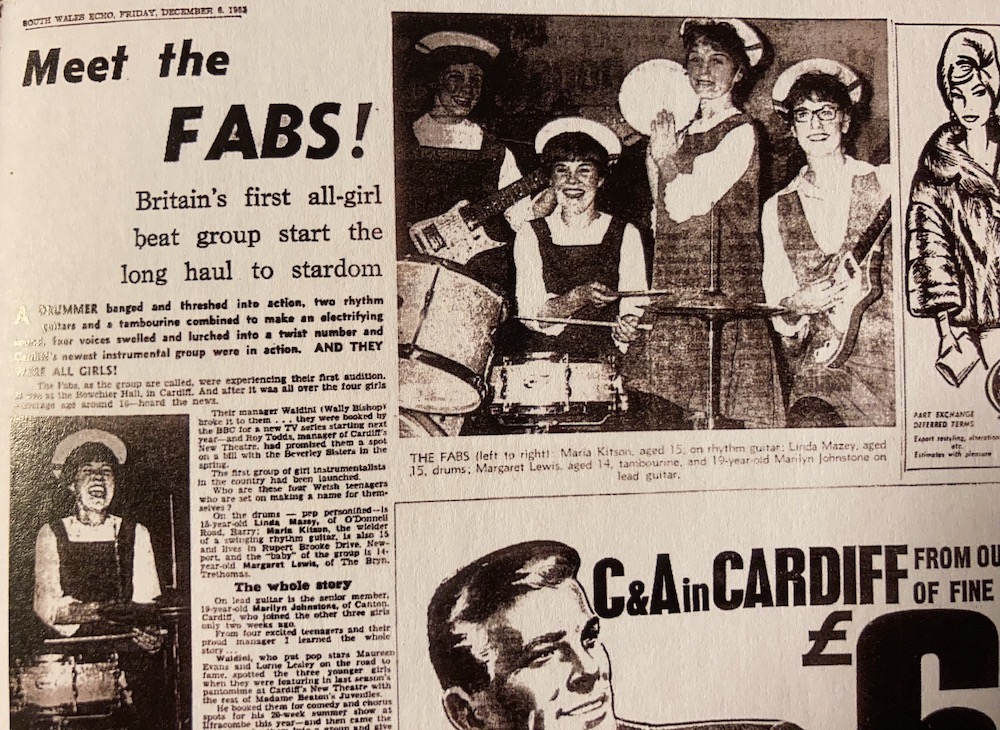
The fact that they were touted as a female Beatles and an all-girl group who played their own instruments in an era when there weren’t any, quickly attracted the attention of local media – and with it the acquisition of a name.
“The name ‘The Fabs’ came about when in December 1963, a female reporter was interviewing us for a local newspaper. It was our first interview, as she asked us what we were called. At the time we had no name. Our favourite word was ‘fab’, we said it all the time. Wally suddenly said, “That’s it, call yourselves The Fabs.”
Playing six nights a week in Wally’s summer show at The Pavilion Theatre in Ilfracombe, they honed their craft on stage and got on famously off it. They were a band of sisters.
“We were all on the same wavelength,” says Sarah. “I thought if anyone ever left it would be impossible to replace her and carry on.
“We came from similar working class backgrounds and had supportive parents. Thankfully no one ever told us to get a proper job.”
Throwing themselves into playing clubs both in Wales and the north of England, they would quickly discover that being four women in a band, would present obstacles that other groups would never have to surmount.
Not least male chauvinism and the misogynistic barbs from male musicians.
“When we worked with other bands they often laughed at us before we played with comments like – ‘Do you know how to put those big drums together love?’ And ‘What type of guitar do you have? Aaw a nice red one!’
“They soon changed their tune once they heard us play. Boy bands were ten a penny. Very often we went down really well, while they made little or no impact.”
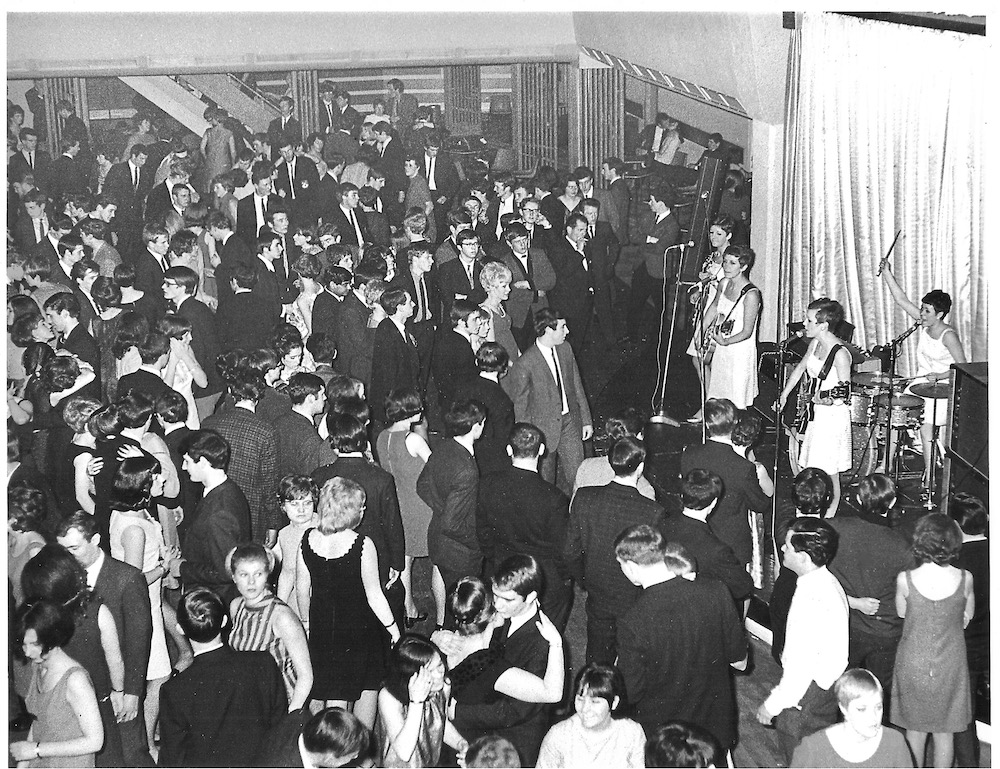
That determination and togetherness manifested itself into their live shows. They quickly built up a following, headlining their own hometown gigs in front of packed audiences at the Top Rank in Cardiff. From university shows to social clubs they were much in demand.
Their shows – a heady mix of style, sass, soaring four part harmonies and eye-catching choreographed moves were arguably a ‘60s forerunner of girl power. Factor in a well rehearsed set of well known covers – such as ‘Glad All Over’ and ‘Hippy Hippy Shake’ – as well as their own self-penned originals, and it was an alluring confection.
In the glare of the spotlight, their shows were not without their unexpected moments, however.
At one university gig, they encountered a monster raving loony, before he had formed the political party of the same name.
“At one gig supporting Screaming Lord Sutch, we were watching him from the side of the stage,” remembers Sarah. “He saw us and proceeded to chase us around the backstage area, screaming and yelling while brandishing an axe. He was a nutcase!”

South Wales valleys workingmen’s club were also a source of colourful shows and equally colourful characters.
“Tom Jones was a big star thanks to ‘It’s Not Unusual,” recalls the former Fab. “Entertainment secretaries loved telling us they had booked him for £15 a night when he was no one.
“One of the big clubs we played regularly was the Tynewydd Labour Club in Treherbert at the top of the Rhondda valley, which held about 500 people.
“The concert chairman was a man called Emrys and he acted as the compere. He was very camp and stood onstage demanding absolute quiet, and wouldn’t start the show until everyone gave best of order. Sometimes it took ages. We just had to stand there on stage like dummies.
“At the end of the night, because we were Welsh, he made us stay on stage and sing the Welsh national anthem.
“Emrys was a real character and certainly not the normal club compere.”
Being four women in a band did bring with it wanted – and unwanted – attention.
“Sometimes at the end of the night someone would offer to help us carry the gear out,” says Sarah. “They were often drunk and would start to pick up heavy amps and speakers and stagger towards the doors and stairs.
“They would also start chatting us up. It was difficult to put them off without being rude. ‘Are you married love?’ ‘Have you got a boyfriend?’ We would be like ‘for god’s sake bugger off!’”
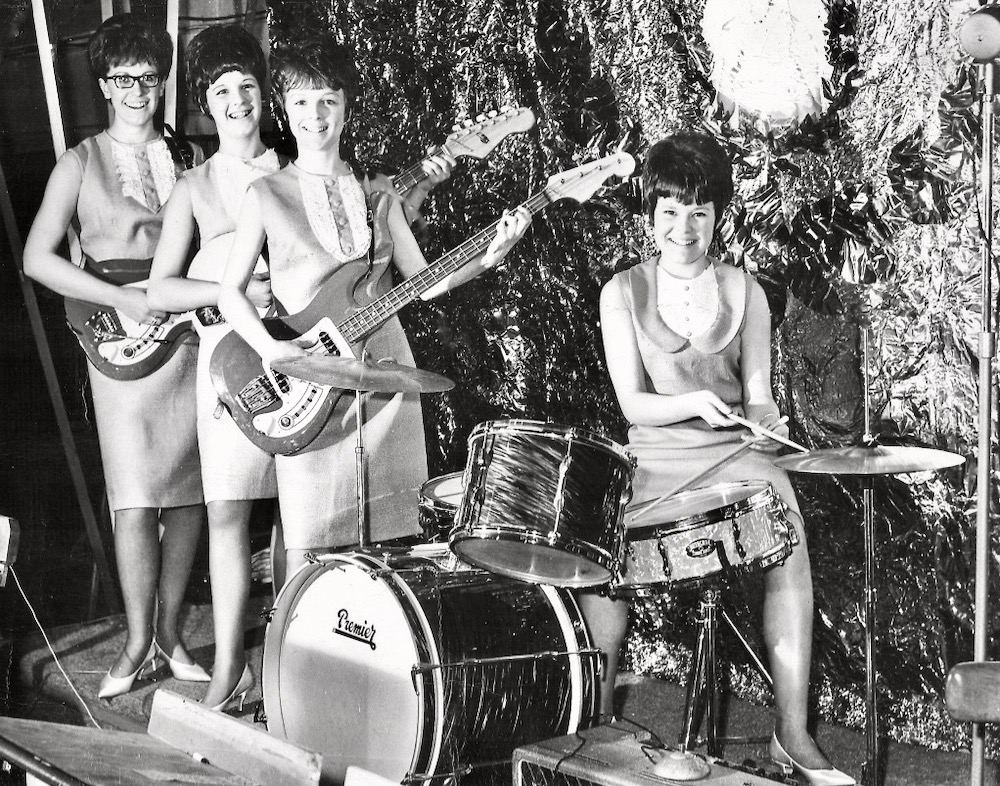
As far as gaining their independence and toughening them up playing working men’s clubs only heightened their guile and feminine wiles.
A big step into the wider world for four young girls came when they were offered a series of residencies at US army bases in Germany, which entailed them performing for fours a night.
“I had been to Jersey on holiday, but neve to the Continent,” remembers the guitarist. “As Maggie was still only 15, she had to have a special licence to work abroad and I was designated as her chaperone.
“When we arrived at the bases it was like little America. There were big flashy American cars, and in the camp restaurant we discovered fast food – pizzas, t-bone steaks, macaroni cheese, hamburgers, peanut butter, steak sandwiches, club sandwiches, cheese burgers, meatballs and BLTs.”
“The audience was all male, about 18/19 years of age who had been drafted into the US Army. They were a long way from home and really appreciated seeing four young girls up on stage, playing music and chatting to them between numbers.”

Although different meanings of English words and phrases caused some confusion – and hilarity.
“One day we wanted to get up early so we asked some of the guys to come around and knock us up.
“They looked at us in shock,” she laughs. “In American speak this refers to getting pregnant. There was also a lot of giggling whenever someone said fanny. It meant bottom to the Yanks, but of course had a totally different interpretation to us.”
Much like The Beatles’ early residencies in Hamburg which hothoused John, Paul, George and Rungo into a tight live proposition, the tour of these German army bases did the same for The Fabs.
They quickly improved and their repertoire expanded – helpful given how long they were signed up to play for.
“We started to sing some of the hits of American girl groups like The Ronettes – ‘Be My Baby’, The Crystals – ‘And Then He Kissed Me’ and ‘Da Doo Ron Ron’, and The Shirelles – ‘Will You Still Love Me Tomorrow’.
“Their songs and arrangements really suited us.
“Sometimes the guys would request numbers so we would practise a song in the afternoon, remember it, and play it that night on stage. They really loved songs like ‘Memphis Tennessee and Kansas City as it reminded them of home.”
Sadly in January 1966, the group’s manager and guiding Wally Waldini became very ill and sadly passed away.
It was a tribute to the impresario however that he had put The Fabs on the road to success – literally and metaphorically.

Now much in demand thanks to signing with an influential agent in Germany, the group bought an old Dennis diesel ambulance painted red, white and blue and set about traveling round playing all over – anything from shows in ski resorts in Austria, to clubs in Spain. They even found themselves playing a two week residency at an US army base in the Azores – a group of islands in the mid-Atlantic.
In between they had suffered several setbacks including the loss of equipment on a train journey from Germany and had hundreds of pounds of their stage dresses stolen from ‘Dennis’ in Spain. However, they were undeterred. They loved their life and were determined to eek every last drop of fun out of fun being in The Fabs.
“It was up to us now, a whole new adventure for four young girls from Wales,” says Sarah. “It felt a bit like us against the world.
“I was like the mother figure as I was that little bit older than the other girls.
“I was very protective of them, but we all looked after each other. We never had fights. Well not very many. We all got on so well.”
Back home in Wales, their parents were hugely proud of their daughters.
“Our parents were really chuffed about our success and wanted to hear all about our travels,” remembers the musician. “They never said they were worried sick about us or anything like that. I guess it was a different time back then. They backed us in everything we did.
“There were no mobile phones or internet, but every week while away, we went to the local post office and phoned home through the international operator. It was quite expensive, so we usually only had three minutes each.We sent postcards and letters from most of the places we went to, and tried to keep our parents updated with our travels as much as possible.”
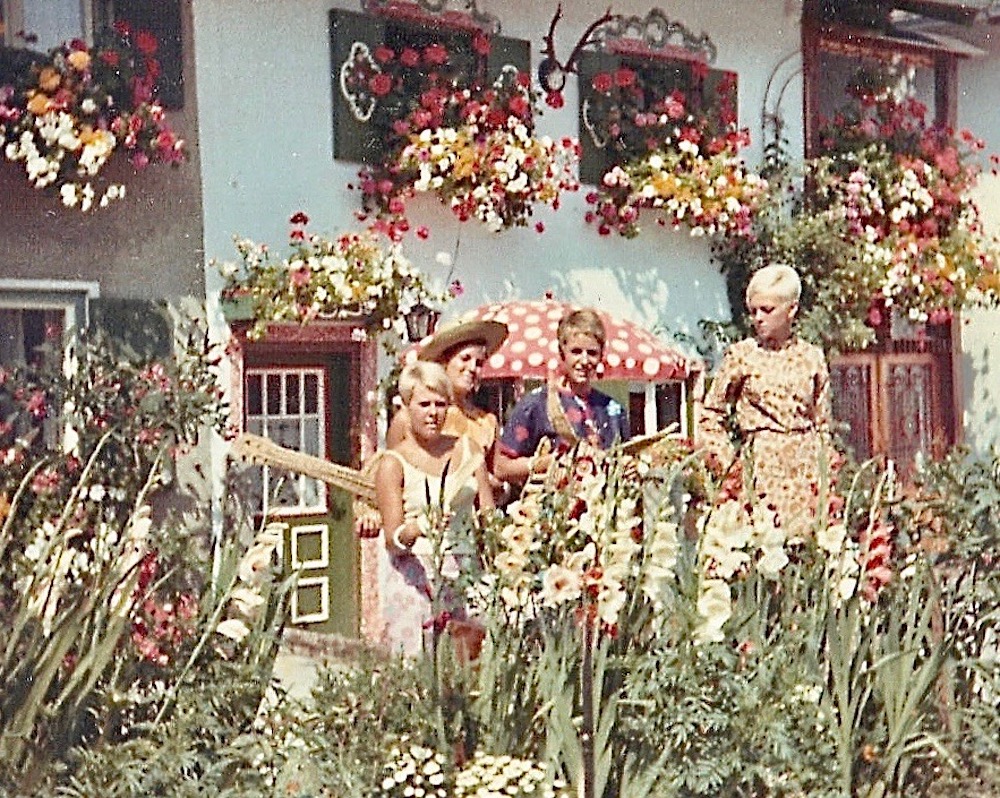
For Sarah and The Fabs the band was not only an opportunity to experience showbiz life, but to live a completely different existence as a woman in the ‘60s.
“When I left school, all my friends at that age were expected to go to be a secretary or a nurse,, the typical female unemployment. A lot of them excelled at what they did, but it was a stopgap until you got married.
“That was the attitude in those days. Nobody really expected you to go off and have a career, certainly not in showbiz. It was very unusual for you to say, well, you know, I’m in a band and make a living and we travel all over. It was unheard of. So whenever we would come home, everyone wanted to know what we’ve been doing and we’d tell them all about our adventures.”
While they excelled abroad, The Fabs found the UK music scene an altogether tougher nut to crack.
“In the UK we suffered from a certain amount of prejudice,” says Sarah. “Snidey remarks were made about girl musicians. “Who is sleeping with who then?” It was male chauvinism at its worst.
“We weren’t treated as equals in the music business. Despite being very good we were never offered a record contract , as at the time girl musicians were fairly insignificant and not deemed commercial by record companies. By traveling abroad we had plenty of work and fett very appreciated.”
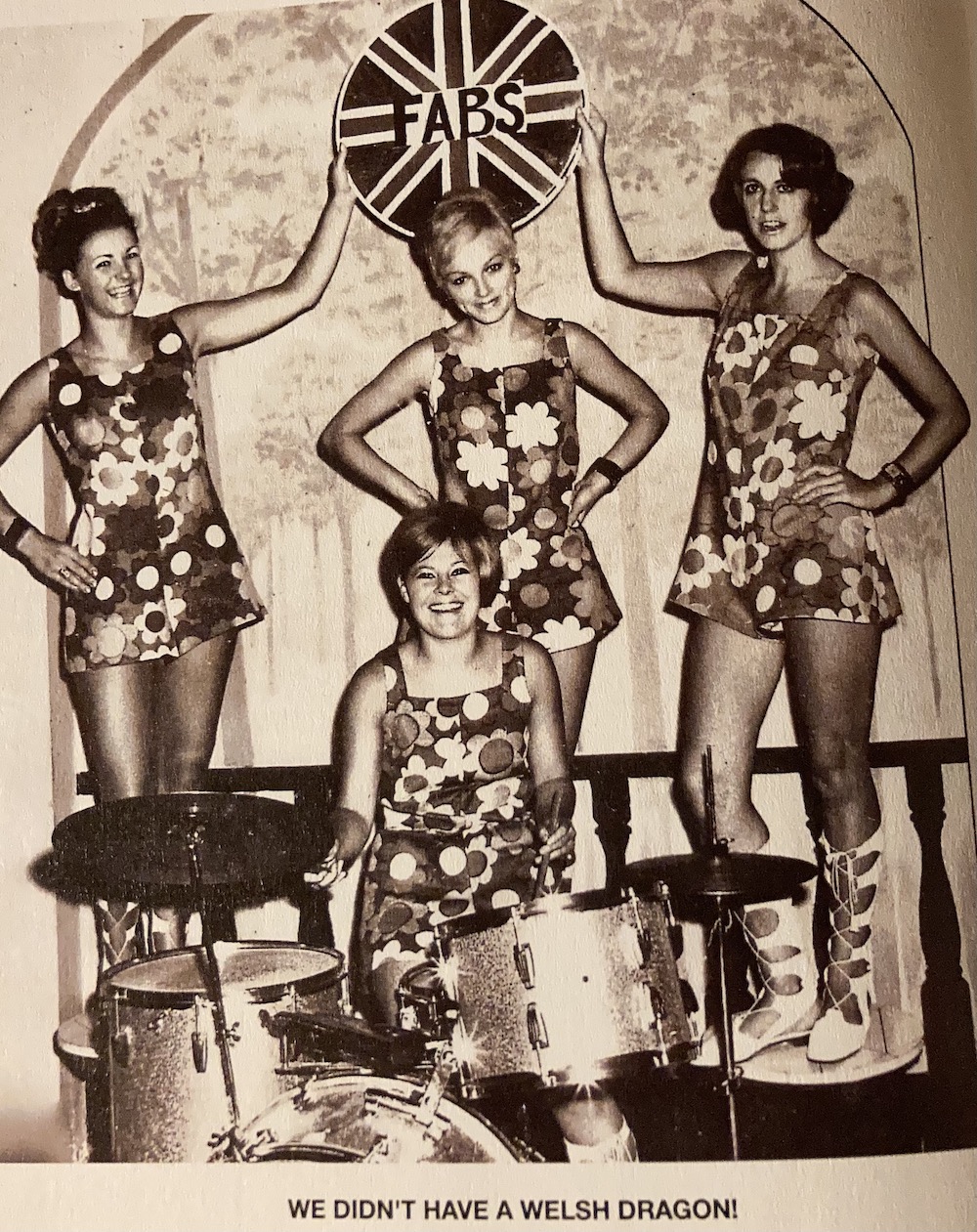
Ironically, it was to be a journey to the other side of the world that would give them their biggest adventure – and a debut album.
When an offer came in for the band to play a year residency at a club called El Senorial, one of the biggest in Mexico City, they were understandably reticent having never ventured further than Europe.
However, the offer they received proved too good to refuse.
“They made a very good offer for us to play four 45 minute sets between 9pm and 3am,” recalls Sarah. “They would pay for return flights for us and our equipment, our accommodation and 2000 dollars a months 500 dollars a week between the four of us. That was a lot of money in those days.
“We also realised that the Olympic Games were being held in Mexico City in August 1968. People started to tell us that it would be an incredible time to be there.”
While success seemed a distant dream in the UK, they were about to become one of the biggest bands in Mexico.
Housed in a beautiful apartment a couple of hundred yards from the club, they quickly settled in and made the most of their surroundings – throwing themselves into the local culture, quickly making friends and keeping the rock ‘n’ roll flame burning brightly.
“We had some great parties at the flat – any excuse be it birthdays, St David’s Day, St Patrick’s Day or just enjoying a night off,” laughs the guitarist. “We had a record player and bought some LPs in a branch of Woolworths. We managed to get The Beatles’ Sgt Pepper’s Lonely Hearts Club Band and played it to death.
“Our parties became very popular and as we got to know more and more people they would all turn up for a good time.”
Earthquake
After one heavy night of partying they were woken at eight in the minute thinking their hangovers were particularly severe – and if their rooms seemed to be moving it was because they actually were. They were in the midst of an earthquake that measured 7.3 on the Richter scale.
Thankfully the band were all okay, their apartment was in a new building which was built with special foundations which meant they rocked back and forth instead of crumbling.
We knew with the Olympic Games being held in a few months time it would be reported back home, so we thought we better let our parents know we wer okay, so we sent postcards.
It took them five days to reach home. Fortunately our parents had been in touch with each other and figured that we were safe as they had no news of any British people being hurt.
“We continued to feel tremors every now and again but didn’t have another severe earthquake during our stay,”
While the tectonic plates were shifting The Fabs were causing tremors of their own – mainly amongst the male population of Mexico City.
“Relationships started to develop and some were quite serious,” remembers Sarah. “These were mainly with other musicians wbut also one of two Mexican guys.
“We attracted a lot of male attention, and one night we hadn’t logn got back from the club and were getting ready for bed when we heard the sound of music in the street. Looking out the window it was a mariachi band. They were serenading Linda!
At the front was a Mexican guy declaring his love for her. She didn’t know who he was but he must have seen her at the club and fallen for her. We thought it was hilarious. Linda rejected his advances and we never saw him again.”
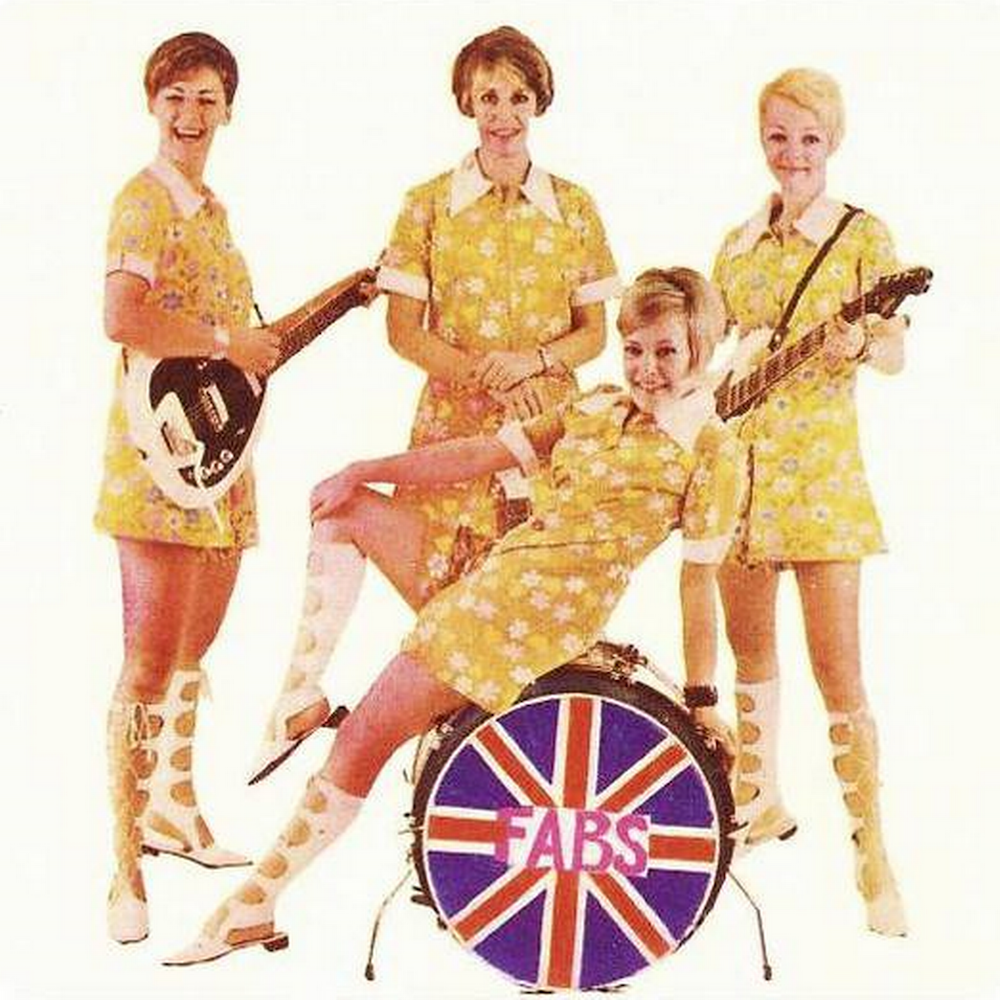
If Beatlemania had been a phenomenon back in the UK, Fabmania was breaking out in Mexico.
“We became quite a hit over there, and did interviews in English on local radio stations. We were also in newspapers and magazines and had professional photo sessions,” recalls Sarah.
The company looking after the girls in Mexico decided that the group should make an album of the songs they sang in the club, cutting 10 tracks in one day in a local studio.
“We played all the music first and then added the vocals. It was a bit rushed but as the songs were very familiar we didn’t make any mistakes. The album was to be sold in the club but was also on sale in Woolworth’s record department downtown.
“As soon as the record was released we wanted to see it in the shop. It was extraordinary to see our album amongst all these famous bands.”
By chance and a sheer stroke of luck they spotted five guys in smart suits with Olympic badges looking somewhat out of place in the store.
Both parties looked equally as shocked to see each other.
The guys turned out to be members of the British Olympic squad competing in the 50km walk.
Sarah and the girls invited them to come watch The Fabs play at the club and the athletes said they would.
A week later, after they had competed in their event, they showed up at El Senorial.
“We had a great evening with them,” Sarah recalls. “While chatting between our sets they offered to get us tickets for some of the track and field events at the games. They also said they would take us into the Olympic village.
“When we asked them how they would do that, they said they would provide us with tracksuit tops and we could walk in with them.
“We arranged to meet them near the Olympic Village and put on tracksuit tops with GB on the back. We tried to look the part although Linda;s top was about six sizes too big. We strolled past a few security guards but no one looked at us twice.
“A journalist took a photograph of us going into the village and the next day it appeared in the local newspaper with the headline ‘British athletes arriving at the Olympic Games.”
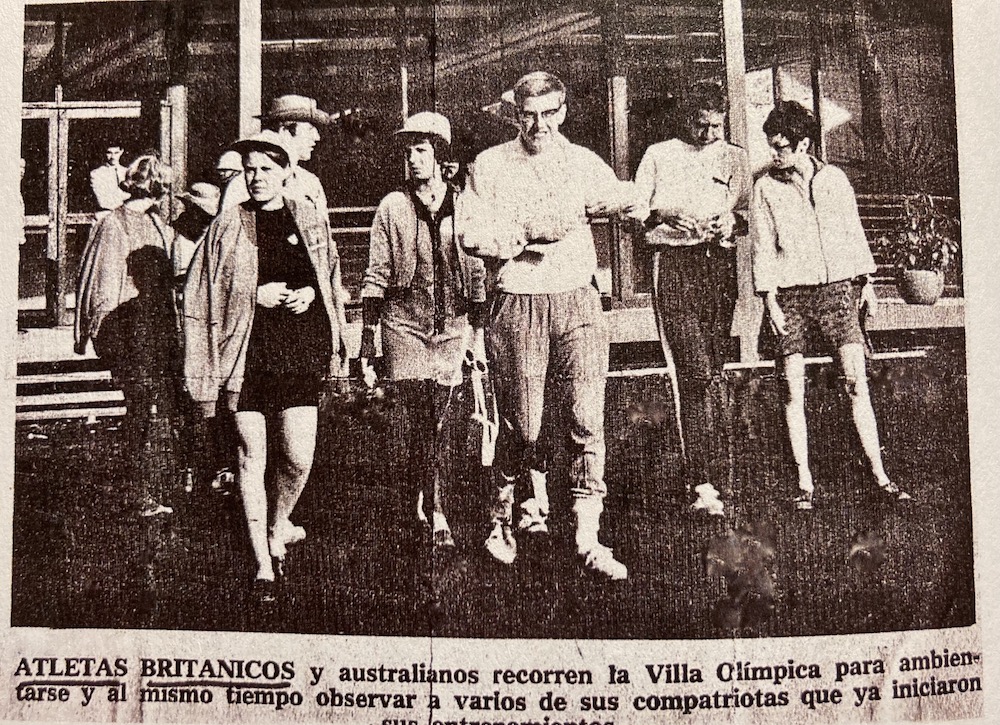
The four girls from South Wales could barely believe their luck. They had their pictures taken with many of the athletes including the golden girl of British athletics Mary Rand and also met sports commentator David Pickering, who had lived in Cardiff for a while and was interested in what these Welsh girls were doing in Mexico.
Little did they know at the time but they were also to be witnesses to history in the making.
Mexico 1968 was the games which saw American long jumper Bob Beamon smash the world record, and his compatriot Dick Fosbury win a gold medal in the high jump performing the ‘Fosbury flop’ for the first time.
It was also memorably the games at which two black American sprinters Tommie Smith and John Carlos each raised a black gloved fist during the playing of the US national anthem in a gesture of defiance against racism, capturing an unforgettably iconic and powerful image.
If the group thought their stay in Mexico wasn’t going to quite hit the heady heights of their Olympics experience they were much mistaken – especially when a bona fide Hollywood superstar took a shine to them.
Sarah remembers the excitement of the night in the club when the waiters rushed around shouting that ‘Steebe Mackerween’ was in the house.
“We thought it was probably a case of mistaken identity, but were shocked when while we were on stage a figure appeared at the door of our bar looking remarkably like Steve McQueen,” she remembers. “He disappeared and we thought he must have left the building.
“I decided during our break to wander downstairs to see if he was still around and then suddenly I felt a tap on my shoulder.
“I turned around and a voice said ‘Hi my name’s Steve’ and there he was. Well, I was shocked and I stuttered to say hello and tell him my name.
“He asked me a few questions about the band and then said ‘What time do you get off?’ | explained it would be near to 1am before we finished and he said, ‘Okay I’m not filming tomorrow, I’ll be waiting for you outside and we’ll find somewhere to go and eat’.
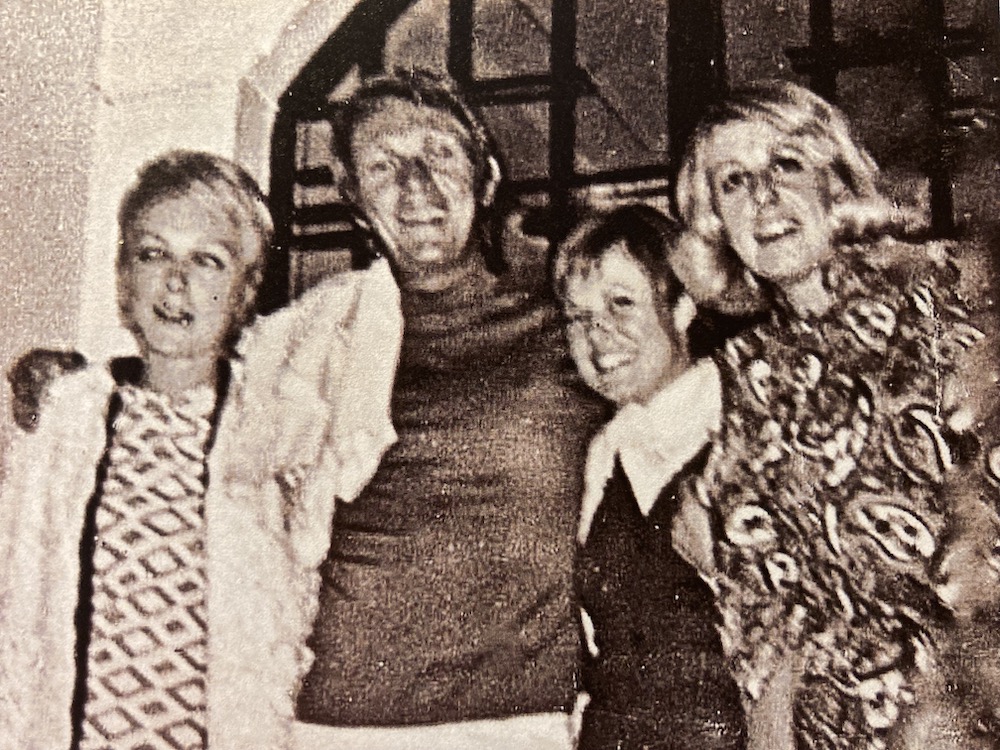
Racing back upstairs to tell the rest of the girls, their immediate thought was that their bandmate was pulling their legs.
“I didn’t really know if he would be there, but when we finished for the night we stepped outside the club and there he was,” she says “I remember he had his bodyguard with him who he sent away.
“We headed to an all night diner called Denny’s, but I don’t think we ate much we just drank coffee and talked for a few hours.
“It was amazing really. He wanted to know all about us. Where we came from, how we came to be in Mexico, and how long we’d been together.
“He also asked us what our star signs were,” says Sarah.
“When Linda said she was an Aries, he laughed and said ‘You must be a real bitch, so was my
second wife!’
“He was every bit the movie star, with natural blonde hair and lovely blue eyes.
“He certainly wasn’t big headed and seemed genuinely happy to just talk and laugh with four girls from Wales who couldn’t quite believe what was happening.”
It also appears he was very much the gentleman.
“He walked us back to the flat, where we had a photo with him,” says Sarah. “It was a Polaroid and amazingly the photograph has survived all these years.”
Nearing the end of their residency in Mexico the group’s thoughts turned to returning home, but there were to be even more eventful days ahead of them.
A group of American businessmen who flew down from San Francisco every few weeks and came to the club when they were in town had befriended the group and said they would arrange a gig for The Fabs in San Francisco, after their stay in Mexico had come to an end.
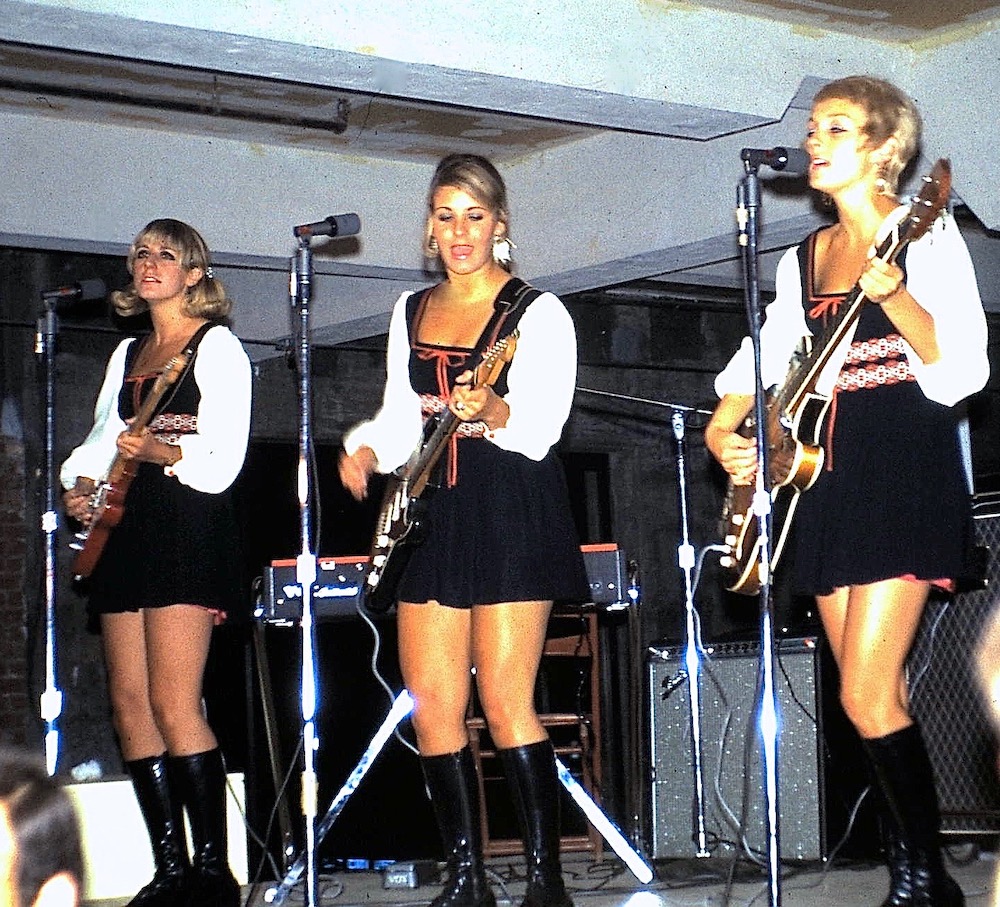
However, under strict Musician Union rules they would not be able to get work permits. Nevertheless that didn’t stop the guys hatching a plan to ensure the band fulfilled their California dream.
“They said they would fly us to San Francisco where we would play a charity gig. Although we wouldn’t get paid they would put us up in a hotel for free. They would also hire the equipment so we wouldn’t have to take ours into the US. We trusted them and it turned out brilliantly.”
The girls packed up all their belongings and said goodbye to the many friends they had made during the most eventful year of their lives.
After bidding adios to Mexico City they flew to San Francisco and played at The Cannery, a famous venue in the city, which got its name after once being the place the fruits of California were canned by the Del Monte company.
In the city famed for flower power these four Welsh girls were budding stars.
“The place was packed and lots of people complimented us and said how much they enjoyed us,” remembers Sarah. “Some people wanted to book us for gigs and it was a shame that we were just passing through.”
At this point the girls went their separate ways – Linda and Marie flew back to the UK, but Maggie and Sarah had been offered tickets on the QE2 by a guy called Manuel Fernandez who worked for Cunard and who had been pursuing Maggie.
The girls gave him their flight tickets and he said with the refund for the plane tickets he would book them on the ship.
When the girls turned up in New York to board the famed cruise liner their names weren’t on the boarding list.
However as they had tickets they were thankfully let on board to travel.
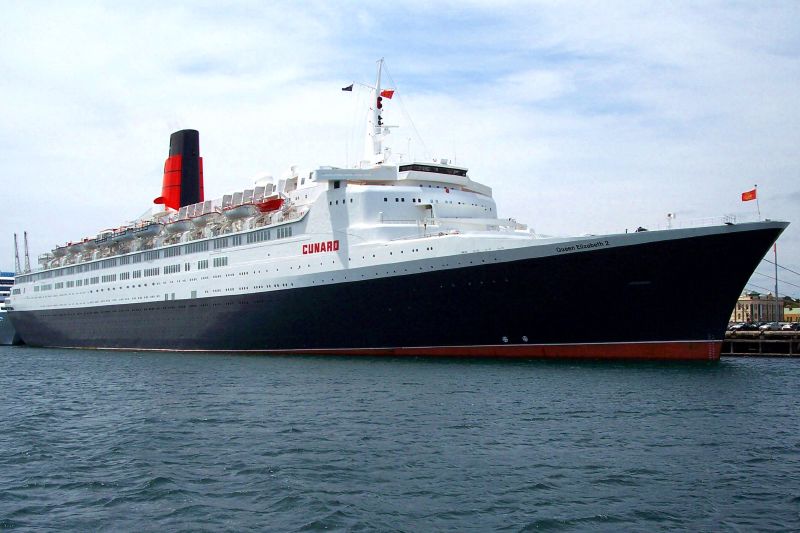
It was only when they arrived back in the UK they received tickets from the Cunard Line and the full extent of what had happened unfolded.
“They asked us who we had paid for the tickets for the QE2,” recalls Sarah. “We told them that we had given our flight tickets to Manuael Fenandez for which the refund would pay for our tickets. They told us that Fernandez was under arrest for fraudulent activity having embezzled a large amount of money from the company.
“It explained why were not on the boarding list and how it was quite possible that we night not even have got on at all if they had investigated at the time.”
Back home a new decade was dawning and the band began to wonder where they went next. At this point all four band members were in serious relationships, their partners traveling with them to many of the shows around the UK and Europe they were playing.
Despite their year away there was no let up in their popularity in the clubs and army bases.
With a new decade had come new management who wanted to take on the band – however they also wanted them to change their name.
“They felt The Fabs did not indicate we were girls,” says Sarah. “They chose the ‘Jonson SIsters’. We went along with it as we thought they were probably right., and if it helped us on the road to success we were happy.
“Sometimes however people who hadn’t seen us thought we were a singing harmony act like The Beverley Sisters – and it didn’t help that in our new publicity shots we didn’t have our instruments.”
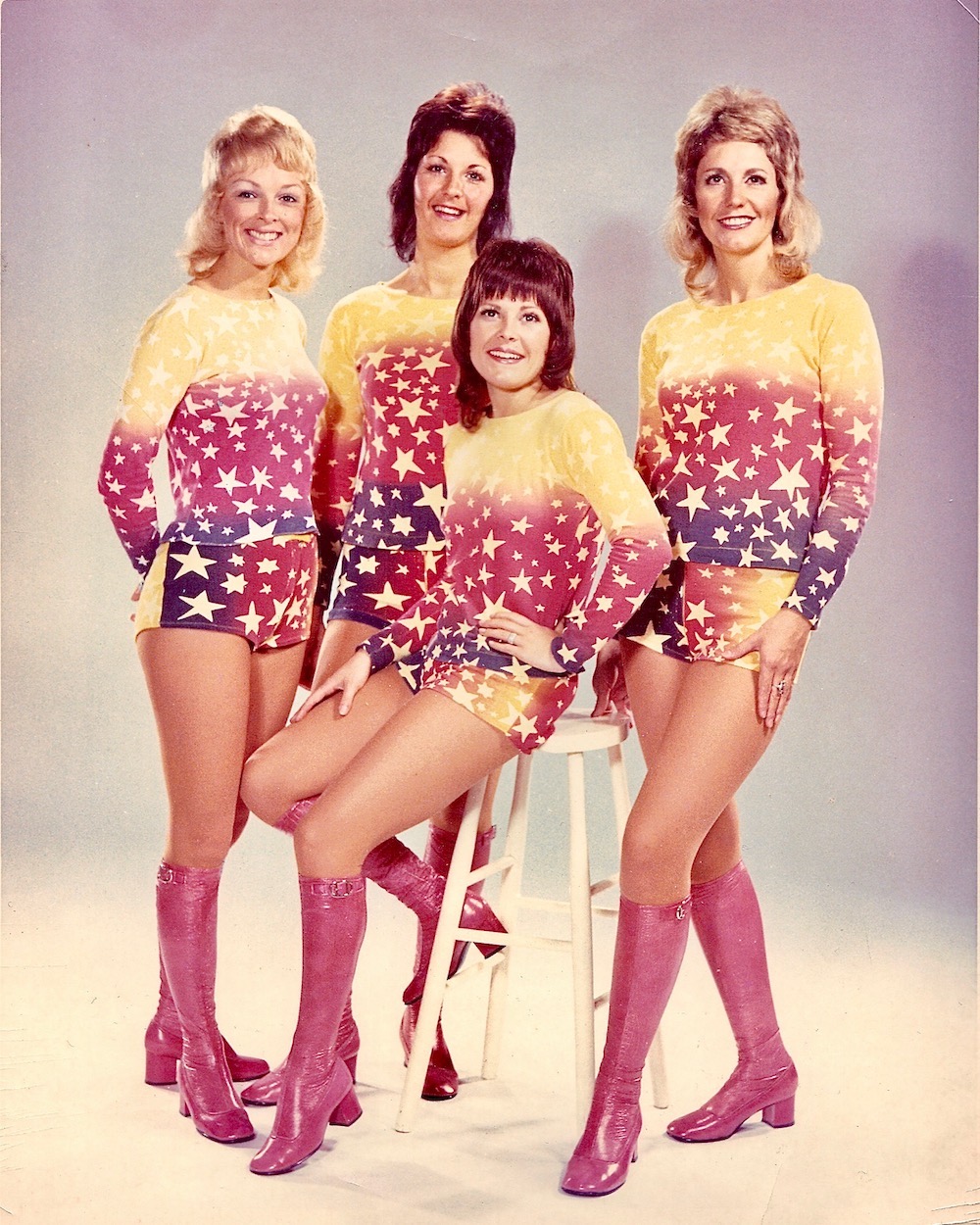
When back in the UK, Sarah had remembered a conversation she’d had with a UK singer called Elaine Delmar who had come to the club to perform for a week.
She’d watched The Fabs play and told them: “What are you girls doing here? There is nothing like you in the UK, you should get back there, you’d be sure to make it.
“She suggested that we should go on Opportunity Knocks, a huge TV talent show that discovered new acts.”
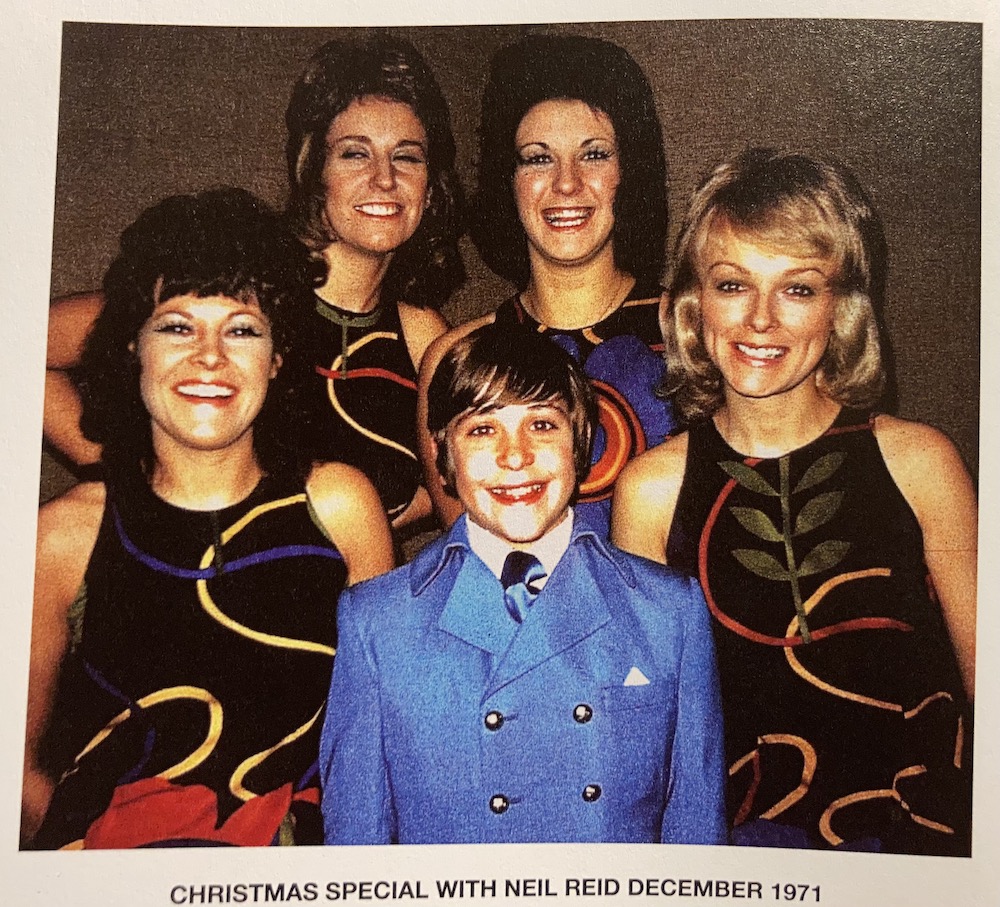
Remembering that conversation the band applied for the show – the ‘70s answer to Britain’s Got Talent – and were successful after auditioning.
Making their first appearance on the show in front of more than 20 million watching at home – a huge figure even then when there were only three TV channels, they were thrilled when they won that week’s show.
The winner of the show – decided by a postal vote as opposed to a phone vote back then – appeared on the following week’s show where they got to battle it out again.
As a winner they would also appear in a grand final at Christmas.
The following week the group came back and finished third, however they had made it through to the Christmas all winners grand final.
This is the point in the band’s history where this story celebrates its own landmark anniversary.
When I meet up with Sarah for a chat and to get a copy of her book, it’s a momentous date in the calendar. A poignant moment that takes her story full circle.
It’s 50 years to the day since Sarah and her band of sisters appeared in the grand final of Opportunity Knocks.
Then on December 21, 1971, the trailblazing group dazzled the watching millions at home.
With their glorious soaring harmonies, coordinated moves, gleaming smiles, and matching mini dresses they looked and sounded as fabulous as their original moniker.
Sadly, they lost out to a toothy 12 year old singer from Scotland called Neil Reid in the final, which also included fellow finalists Little and Large.
Nevertheless, the national TV coverage elevated the band to another level. Now they were booked up months in advance and were asked for their autographs everywhere they went.
It was a moment to savour for a group that had been on a fantastical adventure ever since they formed in Cardiff in 1963.
In an alternate reality this story sees the Welsh group secure the fame and success they no doubt deserved. But as the old adage goes – it was the right place but the wrong time.
As a result of appearing on Opportunity Knocks they were spotted by record producer Tony Hall who wanted to make a record with the band.
Hall had been a DJ on Radio Luxembourg and then became a very successful record producer working with acts like JimI Hendrix, Dusty Springfield and Joe Cocker. He had also discovered Black Sabbath,
Excitingly for the group, the producer had booked a session for them at Rockfield Studios.
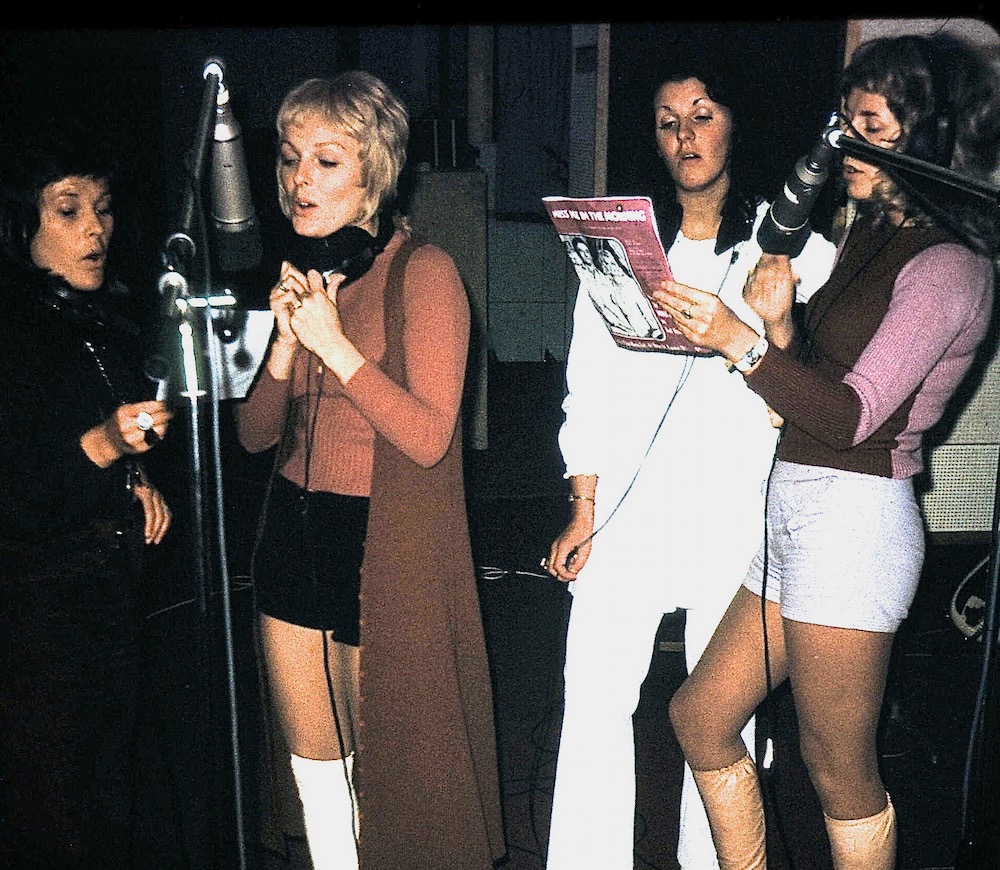
The famous studios in Monmouth had seen some of the biggest bands of the last 50 years record there including Queen, Oasis, The Stone Roses and Coldplay – however the group were the first all female group to record there.
In December 1971, the band appeared in panto at Cardiff’s New Theatre with TV host and comedian Ted Rogers (famous for the hit quiz show 3-2-1).
As the start of 1972 swung around, all was not well within the group. The end was near.
“Instead of being just us four for the first time we had another four people with a say in our futures,” recalls Sarah.
“Our other halves were not in showbiz and expected their futures with us to be their lives not ours.
“Maggie was getting married at the end of the panto, Maria was also planning to get married.”
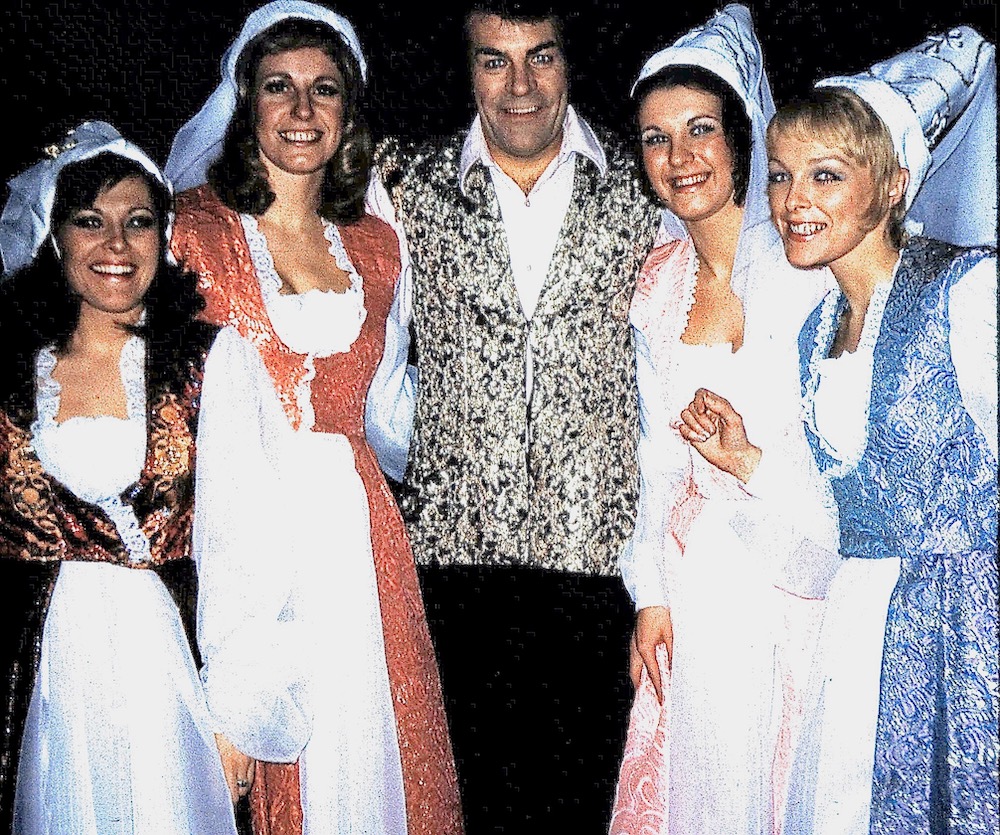
Sarah remembers it was quickly becoming obvious a split was looming.
“We finished the panto with feelings running high,” she says. “We didn’t actually row or fall out, but we all sensed the end was coming.
“The time had come to put our passports in the drawer and fold up our pants.
“To make things worse, or just as well I guess, Tony had to admit that no record company was willing to take us on. There were no indie record companies then and the music industry was still very male dominated.
“He was very disappointed and wanted to carry on, but even then the UK wasn’t ready for a girl band. We had to tell him that we were going to break up.”
Looking back now, the musician and mother of two, only has fond memories of an incredible time in her life.
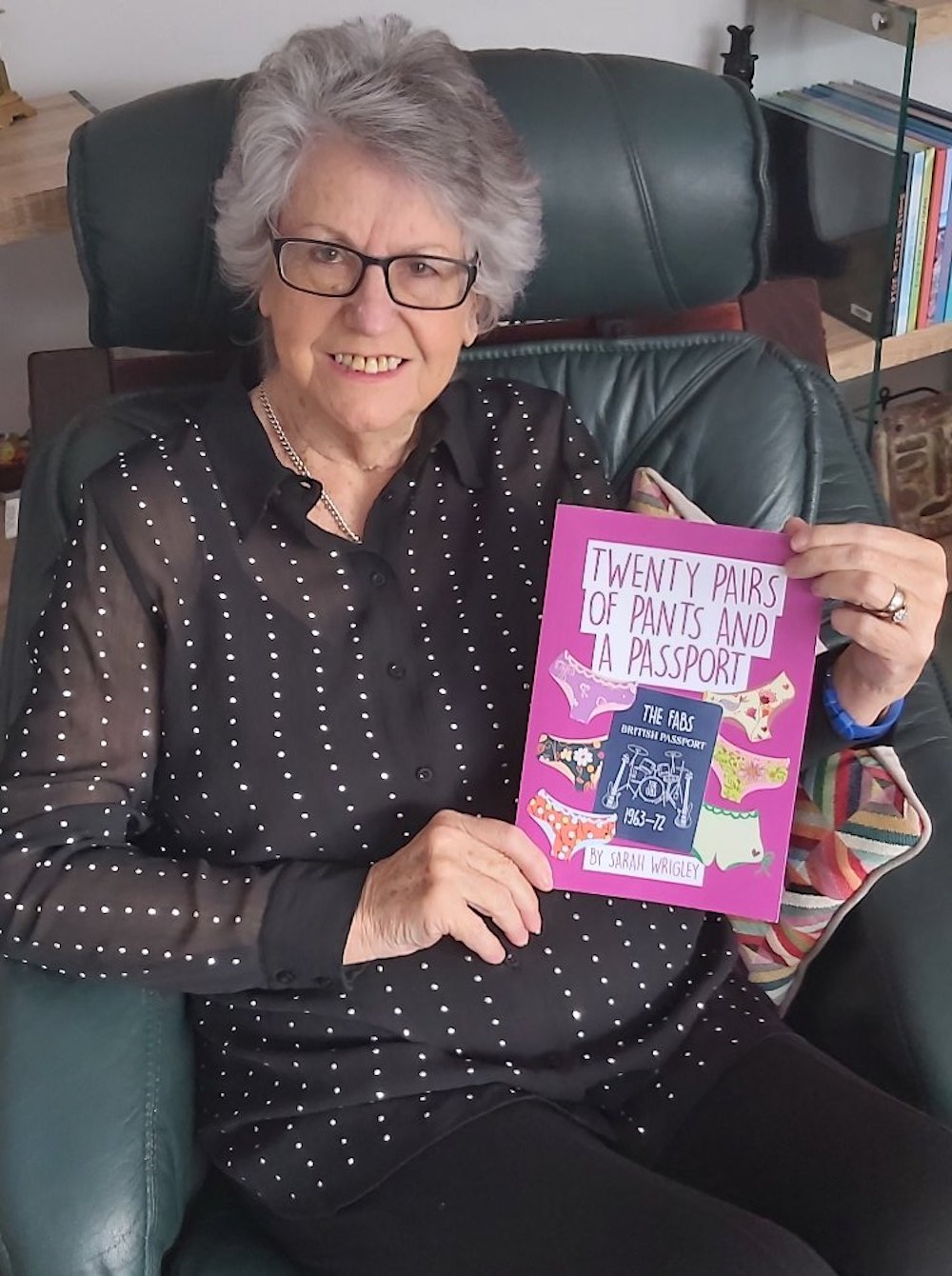
Sadly bass player Maggie passed away in 2013, but Sarah and the remaining Fabs are still firm friends bonded by their experiences in a band.
“We started in Wales and eight years later we bowed out in Wales,” she says.
“We remain lifelong friends. We had been together much longer than many groups. We had travelled to places we’d hardly heard of. We met fabulous people and had wonderful times, which we’ve never forgotten.
“Should we have made it? Were we born too soon? It doesn’t really matter. We took our opportunities and never had any regrets.
“Life is what you make it, and we made the most of ours during those years together.
“Nothing can take those memories away.
“It was fab!”
Twenty Pairs of Pants and a Passport by Sarah Wrigley is available now priced £10.
Email [email protected] to order a copy.
Support our Nation today
For the price of a cup of coffee a month you can help us create an independent, not-for-profit, national news service for the people of Wales, by the people of Wales.







Where can I buy Sarah’s book?